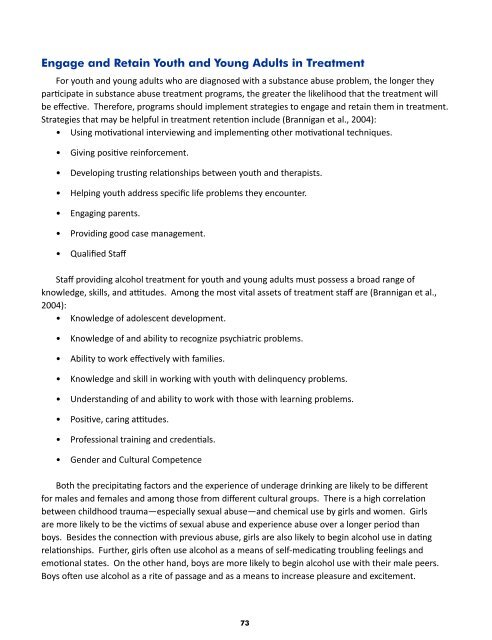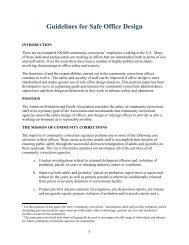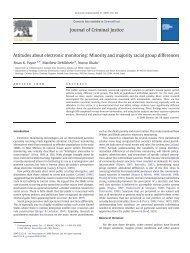Intervention Principles and Practice Guidelines for - Underage ...
Intervention Principles and Practice Guidelines for - Underage ...
Intervention Principles and Practice Guidelines for - Underage ...
Create successful ePaper yourself
Turn your PDF publications into a flip-book with our unique Google optimized e-Paper software.
Engage <strong>and</strong> Retain Youth <strong>and</strong> Young Adults in Treatment<br />
For youth <strong>and</strong> young adults who are diagnosed with a substance abuse problem, the longer they<br />
participate in substance abuse treatment programs, the greater the likelihood that the treatment will<br />
be effective. There<strong>for</strong>e, programs should implement strategies to engage <strong>and</strong> retain them in treatment.<br />
Strategies that may be helpful in treatment retention include (Brannigan et al., 2004):<br />
• Using motivational interviewing <strong>and</strong> implementing other motivational techniques.<br />
• Giving positive rein<strong>for</strong>cement.<br />
• Developing trusting relationships between youth <strong>and</strong> therapists.<br />
• Helping youth address specific life problems they encounter.<br />
• Engaging parents.<br />
• Providing good case management.<br />
• Qualified Staff<br />
Staff providing alcohol treatment <strong>for</strong> youth <strong>and</strong> young adults must possess a broad range of<br />
knowledge, skills, <strong>and</strong> attitudes. Among the most vital assets of treatment staff are (Brannigan et al.,<br />
2004):<br />
• Knowledge of adolescent development.<br />
• Knowledge of <strong>and</strong> ability to recognize psychiatric problems.<br />
• Ability to work effectively with families.<br />
• Knowledge <strong>and</strong> skill in working with youth with delinquency problems.<br />
• Underst<strong>and</strong>ing of <strong>and</strong> ability to work with those with learning problems.<br />
• Positive, caring attitudes.<br />
• Professional training <strong>and</strong> credentials.<br />
• Gender <strong>and</strong> Cultural Competence<br />
Both the precipitating factors <strong>and</strong> the experience of underage drinking are likely to be different<br />
<strong>for</strong> males <strong>and</strong> females <strong>and</strong> among those from different cultural groups. There is a high correlation<br />
between childhood trauma—especially sexual abuse—<strong>and</strong> chemical use by girls <strong>and</strong> women. Girls<br />
are more likely to be the victims of sexual abuse <strong>and</strong> experience abuse over a longer period than<br />
boys. Besides the connection with previous abuse, girls are also likely to begin alcohol use in dating<br />
relationships. Further, girls often use alcohol as a means of self-medicating troubling feelings <strong>and</strong><br />
emotional states. On the other h<strong>and</strong>, boys are more likely to begin alcohol use with their male peers.<br />
Boys often use alcohol as a rite of passage <strong>and</strong> as a means to increase pleasure <strong>and</strong> excitement.<br />
73

















